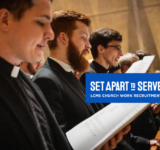Paragraphs 19-21 of Preface to Book of Concord
The Confessors in this section continue to state their desire not to introduce any new doctrine but to see that true doctrine is goal of their work of concord, especially in the area of the personal union of Christ and its implications for the Lord’s Supper.
With guests Rev. Dr. Kevin Golden of Village Lutheran Church in Ladue, Missouri, and Scott Diekmann, Layperson from Seattle, Washington.
The Book of Concord
19) As to the phrases and forms of expression which are employed in this Book of Concord, when we treat of the majesty of the human nature in the person of Christ, elevated and placed at the right hand of God, in order to remove all subtle suspicions and causes of offense which might arise from the different significations of the word abstract, (as both the schools and the fathers have hitherto employed this term,) our theologians in distinct and express words wish to testify that this majesty is in no way to be ascribed to the human nature of Christ outside of the personal union, neither are we to grant that the human nature possesses this majesty as its own or by itself (even in the personal union) essentially, formally, habitually, subjectively. (The schools like these terms, although they are not good Latin.) For if we would adopt this method both of speaking and teaching, the divine and human natures with their properties would be confounded, and the human, with respect to its essence and properties, would be made equal to the divine, yea, indeed, would be altogether denied. Therefore the theologians judge that we ought to believe that this occurs according to the method and economy of the hypostatic union, as learned antiquity has spoken cautiously concerning this subject, that it is a mystery so great as to exceed all the powers of our natural ability and understanding.
20) As to the condemnations, censures, and rejections of godless doctrines, and especially of that which has arisen concerning the Lord’s Supper, these indeed had to be expressly set forth in this our declaration and thorough explanation and decision of controverted articles, not only that all should guard against these condemned doctrines, but also for certain other reasons could in no way have been passed by. Thus, as it is in no way our design and purpose to condemn those men who err from a certain simplicity of mind, but are not blasphemers against the truth of the heavenly doctrine, much less, indeed, entire churches, which are either under the Roman Empire of the German nation or elsewhere; nay, rather has it been our intention and disposition in this manner openly to censure and condemn only the fanatical opinions and their obstinate and blasphemous teachers, (which, we judge, should in no way be tolerated in our dominions, churches, and schools,) because these errors conflict with the express Word of God, and that, too, in such a way that they cannot be reconciled with it. We have undertaken this also for this reason, viz., that all godly persons might be warned diligently to avoid them. For we have no doubt whatever that even in those churches which have hitherto not agreed with us in all things many godly and by no means wicked men are found who follow their own simplicity, and do not understand aright the matter itself, but in no way approve the blasphemies which are cast forth against the Holy Supper as it is administered in our churches, according to Christ’s institution, and, with the unanimous approval of all good men, is taught in accordance with the words of the testament itself. We are also in great hope that, if they would be taught aright concerning all these things, the Spirit of the Lord aiding them, they would agree with us, and with our churches and schools, to the infallible truth of God’s Word. And assuredly, the duty is especially incumbent upon all the theologians and ministers of the Church, that with such moderation as is becoming they teach from the Word of God also those who either from a certain simplicity or ignorance have erred from the truth, concerning the peril of their salvation, and that they fortify them against corruptions lest perhaps, while the blind are leaders of the blind, all may perish. Wherefore, by this writing of ours, we testify in the sight of Almighty God and before the entire Church that it has never been our purpose, by means of this godly formula for union to create trouble or danger to the godly who to-day are suffering persecution. For, as we have already entered into the fellowship of grief with them, moved by Christian love, so we are shocked at the persecution and most grievous tyranny which with such severity is exercised against these poor men, and sincerely detest it. For in no way do we consent to the shedding of that innocent blood, which undoubtedly will be required with great severity from the persecutors at the awful judgment of the Lord and before the tribunal of Christ, and they will then certainly render a most strict account, and suffer fearful punishment.
21) In regard to these matters (as we have mentioned above) it has always been our purpose that in our lands, dominions, schools, and churches no other doctrine be proclaimed and accurately set forth than that which is founded upon the Word of God, and contained in the Augsburg Confession and the Apology, (and that, too, when understood properly in its genuine sense,) and that opinions conflicting with these be not admitted; and indeed, with this design, this formula of agreement was begun and completed. Therefore before God and all mortals we once more declare and testify that in the declaration of the controverted articles, of which mention has already been made several times, we are not introducing a new confession, or one different from that which was presented in the year 1530 to Charles V, of happy memory, but that we wished indeed to lead our churches and schools, first of all, to the fountains of Holy Scripture, and to the Creeds, and then to the Augsburg Confession, of which we have before made mention. We most earnestly exhort that especially the young men who are being educated for the holy ministry of the churches and schools be instructed in this faithfully and diligently, in order that the pure doctrine and profession of our faith may, by the help of the Holy Ghost, be preserved and propagated also to our posterity, until the glorious advent of Jesus Christ, our only Redeemer and Savior. Since, therefore, such is the case, and being instructed from the Prophetic and Apostolic Scriptures, we are sure concerning our doctrine and confession, and by the grace of the Holy Ghost our minds and consciences have been confirmed to a greater degree, we have thought that this Book of Concord ought to be published. For it seemed exceedingly necessary that, amidst so many errors that had arisen in our times, as well as causes of offense, variances, and these long-continued dissensions, there should exist a godly explanation and agreement concerning all these controversies, derived from God’s Word, according to the terms of which the pure doctrine might be discriminated and separated from the false.






